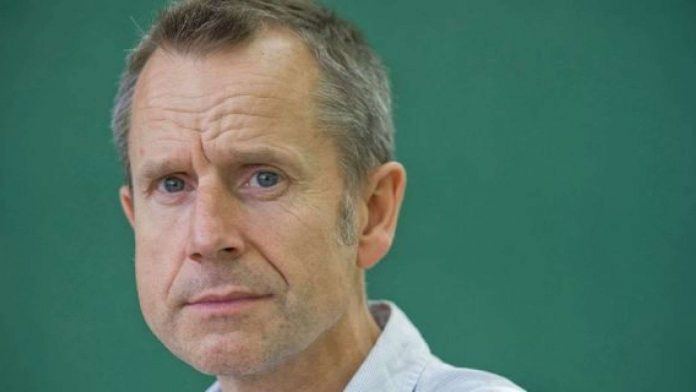Jeremy Hardy, who has died aged 57, was a British comedian and broadcaster who was most widely-known for his appearances on television panel shows such as Mock the Week and QI, and particularly as a regular on some of BBC Radio 4’s flagship comedy programmes, including The News Quiz, I’m Sorry I Haven’t a Clue and Just a Minute. Between 1993 and 2014 he hosted 49 episodes of Jeremy Hardy Speaks to the Nation on Radio 4, a series of comedy lectures which he used to address subjects as diverse as how to be truly free, how to be an adult and how to hand the world on to the next generation.
As a young stand-up, Hardy won the Perrier Award (now the Edinburgh Comedy Award) at the Edinburgh Fringe in 1988, having been one of the finalists the previous year; among those he was up against were the Red Dwarf actor Robert Llewellyn and the Australian comedy rock group the Doug Anthony All Stars. His other personal broadcast works included the radio sitcom Unnatural Acts, a supposed recreation of his and then-wife Kit Hollerbach’s own home life, which ran from 1987 to 1990 and was renamed At Home with the Hardys for its third and final season.
The 1996 Channel 4 comedy Jack and Jeremy’s Real Lives – a follow-up to the previous year’s one-off Jack and Jeremy’s Police 4 – saw Hardy and Jack Dee send up the mockumentary format with a cast of strange and unusual fictional characters, including paranormal investigators and hospital profiteers, while his most recent radio show was 2018’s Jeremy Hardy Feels It, in which Hardy attempted to explore a quartet of human emotions in happiness, sadness, fear and hope.
His acting roles were infrequent and generally of the cameo variety, but together they lent him an impressive filmography. He was in the background of Neil Jordan’s Oscar-nominated Mona Lisa (1986), the cheerful head of a firing squad in the second episode of the classic Blackadder Goes Forth (1989), a ‘flamenco troupe administrator’ in Mike Figgis’ experimental ensemble comedy drama Hotel (2001) and a care centre manager in the Robert Pattinson-starring indie drama How to Be (2008). He was one of the voice cast in the satirical 1980s British puppet show Spitting Image, made early appearances on Terry Wogan and Rory Bremner’s shows, and once hosted Top of the Pops.
In 2003 he was the star of the documentary film Jeremy Hardy vs the Israeli Army, in which he experienced life on the West Bank at the invitation of the International Solidarity Movement of Palestine. Reviews at the time noted his even-handedness regarding both sides he encountered, and the Guardian said in reviewing it that “Britain might just have found its very own Michael Moore.” This project, more than most others, reflected the other side of Jeremy Hardy the comedian as a committed activist for campaigns related to social justice and political concerns of the left. He was a vocal supporter of Jeremy Corbyn, and caused controversy when he joked on air that supporters of the BNP “should be shot”.
Shortly after Hardy’s death was announced, Corbyn tweeted in condolence that he had been “a dear, lifelong friend. He always gave his all for everyone else and the campaigns for social justice.” Mark Steel, a comedian who shared Hardy’s point of view, said they had been friends for thirty-five years; “knowing him as I did, I know he wouldn’t want you to be sad, he’d want you to be bloody devastated.” Richard Osman called him “a man who chose to use his comedy to change the world, rather than to fill stadia.” Sandi Toksvig said he was “part genius, party naughty school boy… He was steadfast and true in his politics and in his friendships.”
Jeremy James Hardy was born the youngest of five children in Farnborough, Hampshire, to Sheila and rocket scientist Donald, and unfocused early ambitions towards getting into journalism, poetry or acting led him to study history and politics at the University of Southampton. Having been unsuccessful at getting onto a journalism course and frustrated by lack of interest in the scripts he was writing, he began to perform in London stand-up clubs in 1984, at the age of 23.
At a time of high graduate unemployment he often played for food, and was one of a number of comedians who took advantage of the £40-a-week Enterprise Allowance Scheme. As Hardy had it, the scheme was “the only decent thing [Margaret Thatcher] ever did.” He eventually found his way into newspapers, writing a column for the Guardian and later the Evening Standard magazine, and his books included the study of fatherhood When Did You Last See Your Father? (1992) and his search for his own ancestry My Family and Other Strangers (2010).
It was remarked when he lost the former column in 2001 that it had become too serious and political; this might be backed up by the fact Hardy treated it as a job of serious reportage, interviewing the subjects of his stories personally. “Frankly, I do not see my job as keeping our rulers on their toes; I’d rather see them hanging by their feet,” he said in his final Guardian column. “Perhaps I should have been more ironic, but then you might have thought I didn’t mean it, and I did.”
After a period of illness, Hardy died of cancer at the age of 57, his second wife Katie Barlow and his daughter with his first wife Elizabeth by his side.








